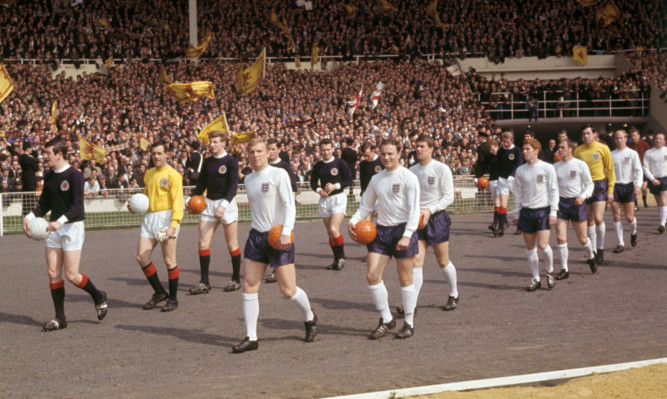With the Scotland and England football teams clashing for the first time in 14 years, Dr Stuart Waiton, the author of Snobs Law: Criminalising Football Fans in an Age of Intolerance, asks: Can we still slag off the English?
Well, when I say we, I of course mean you, as I am English. I’ve lived in Scotland for 23 years and never had any bother about my Englishness. My wife has had a bit, but she’s a “posh southerner” so me and the kids (who are Scottish) think she kind of deserves it.
In fact, come to think of it, I did have a defender on an opposing team scream, “Braveheart you c***”, in my face once. But that was just after I’d hit a nice lob over his keeper’s head and he seemed pretty thick to me anyway, so I actually enjoyed his wrath.
Some people may not like the English very much, a few may passionately hate us, but let’s face it, anti-English “racism” really isn’t a problem up here.
However, nowadays when England play Scotland, or pubs put up various flags slagging off one team or the other, you can almost guarantee a visit from the local bobby (or is that boaby?).
In 2010, during the World Cup, the landlord of the Post Office Bar in Broughty Ferry was asked by the police to take down banners with “Anyone but England” on them, on the basis that they were offensive. Today, I hear that a pub in Dunbar has been ordered to take down a sign advertising Wednesday’s game as “Scotland vs Them”.
Once again it was the police themselves who took this action, illustrating one of the ways that they have become arbiters of offence even if and when no offence has been taken by anybody. So my fragile Englishness has once again been protected by the forces of law and order!
These examples may seem trivial but they are a worrying indication of the extent to which relationships between people are being micro-managed and policed today. Essentially the most thin-skinned chronically offended individual is becoming the presumed norm when dealing with banter or insults and almost anything can be reclassified as “offensive”.
One of the obvious problems with this (as well as the humourless nature of it) is that previously unproblematic exchanges between people become problematic. We all have to start watching what we say and looking over our shoulder in case offence is being taken by anyone. We all start acting (and potentially reacting) as if everybody around us and possibly even we ourselves are fragile victims who need to be tiptoed around. Hardly the recipe for a good atmosphere in a pub or indeed in society.
In fact, similar to football grounds where (in my opinion) swear and insult sheets should be handed out to every punter as they enter the ground, pubs themselves should be places where people feel free to exchange arguments, banter and even insults (within reason) if they so wish. Indeed the Public House as it was originally called was meant to be just that, a place for people, free from workplace discipline and the morality of the home, where men (and today women) could and can be part of this free unregulated collective group called the “public”.
In fact it was the freedom in places like pubs and indeed football grounds that helped to make and remake the informal norms and bonds that made up what it meant to be part of a community.
Today the offence police may think that they are doing society a favour by increasingly policing our language, but the effect is in fact the opposite it is to undermine the basic freedoms that allow relationships between people, warts and all, to develop spontaneously.
Not long ago we used to teach children that “words will never harm you”. This, of course, was never entirely true but it was nevertheless a good lesson based on the acceptance that there was a difference between words and actions. Violent actions were not acceptable and ultimately were against the law, “violent” or offensive words on the other hand were something that children, in a free society, needed to learn to deal with.
Today in Scotland the list of words and types of behaviour that can be classified as both offensive and against the law is growing almost by the week. This infantilised over-protection of adult sensibilities is hardly the recipe for creating a nation of Bravehearts. This is, perhaps, one of the reasons that Scotland will get “humped” at Wembley by my English brethren.
Bring it on!
